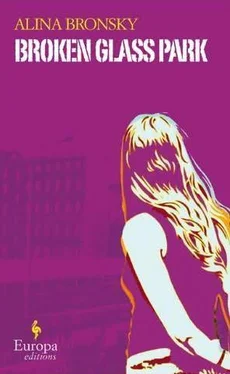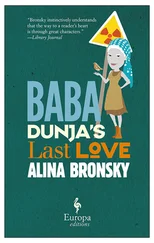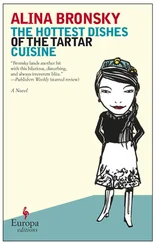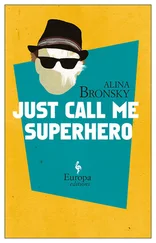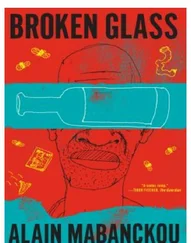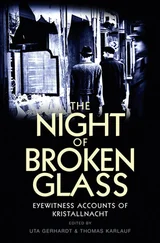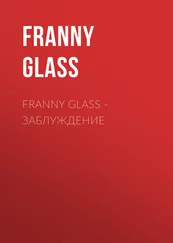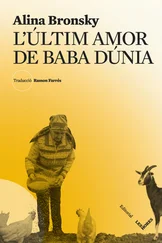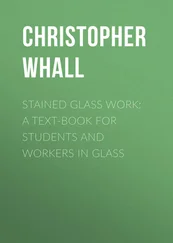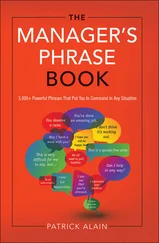Alina Bronsky
Broken Glass Park
For Galina, Leonid, and Michael.
In memory of Nadezhda Zotova.
Sometimes I think I’m the only one in our neighborhood with any worthwhile dreams. I have two, and there’s no reason to be ashamed of either one. I want to kill Vadim. And I want to write a book about my mother. I already have a title: The Story of an Idiotic Redheaded Woman Who Would Still Be Alive If Only She Had Listened to Her Smart Oldest Daughter. Or maybe that’s more of a subtitle. But I have plenty of time to figure it out because I haven’t started writing yet.
Most of the people who live around here don’t have any dreams at all. I’ve asked. And the dreams of the ones who do have them are so pathetic that if I were in their shoes I’d rather not have any.
Anna’s dream, for instance, is to marry rich. Her dream man would be a judge in his mid-thirties, and, fingers crossed, not too terribly ugly.
Anna is seventeen, same as I am, and she says she’d get married immediately if a guy like that came along. That way she could finally move out of the Emerald and into the judge’s penthouse apartment. Nobody but me knows that Anna sometimes takes the tram downtown and wanders a dozen times around the courthouse in the hope that her judge will finally come out and discover her, give her a red rose, take her out for ice cream, and then invite her back to his penthouse.
She says you’ll never get lucky if you don’t fight for it; if you don’t fight, the moment will just pass you by.
“Do you have any idea what Emerald means, you stupid cow?” I ask her. “It’s the most elegant way to cut a diamond, and a fine gemstone itself. That’s got to be appealing to you. You’ll never live in another Emerald if you move out of this place.”
“You just made that up. They would never in a million years have named this heap of concrete after a diamond cut,” says Anna. “And by the way, when you know too much, you get old and wrinkled faster.” That’s a Russian saying.
As Anna’s judge could take a while, for now she’s sleeping with Valentin, who has a third-rate dream of his own. He wants a brand-new, snow-white Mercedes. First he’ll have to get his driver’s license. Which costs a lot. That’s why he delivers advertising brochures door to door before school. Since the money to be made at that is barely a trickle, Valentin also cleans the house of an old married couple twice a week. The couple lives on the other side of town. He got the job through his mother, who cleans the place next door. Nobody can know he’s a housecleaner — if the guys at school found out, they’d never let him live it down, and Anna would split up with him.
Valentin usually has a look on his face as if someone just shoved a cactus down his pants. I think it’s because he realizes that even if he eventually gets enough money together to take driver’s ed classes and get his license, it would take another two lifetimes of cleaning houses to buy a white Mercedes. And then maybe in his third lifetime he’d be able to hop in and actually take a spin.
Peter the Great, on the other hand, dreams of a natural blonde with dark eyes. He was with Anna before. She has brown eyes but she’s not natural — not natural blond, anyway. Now he’s with another girl, one from his class at school. But it’s less convenient, as she lives downtown rather than here in the Emerald. Since they got together, he complains he spends half his life on the tram. But while he’s on it, he keeps his eyes peeled for other blondes.
He was never interested in me — my hair’s too dark.
My name is Sascha Naimann. I’m not a guy, even though everyone in this country seems to think so when they hear my name. I’ve given up counting how often I’ve had to explain it to people. Sascha is a short form of Alexander and Alexandra. I’m an Alexandra. But my name is Sascha — that’s what my mother always called me, and that’s what I want to be called. When people address me as Alexandra, I don’t even react. That used to happen a lot more when I was new in school. These days it only happens when there’s a new teacher.
Sometimes I think I don’t ever want to meet any new people because I’m sick of having to explain everything from scratch. Why my name is Sascha and how long I’ve lived in Germany and how come I speak German so well — ten times better than all the other Russian Germans put together.
I know German because my head is filled with a gray matter shaped like a big walnut. Macroscopically it has lots of ridges and microscopically loads of synapses. I probably have a few million more than Anna — definitely. Besides German, I also know physics, chemistry, English, French, and Latin. If I ever get a B on an assignment, the teacher comes over to me and apologizes.
I’m particularly good at math. When we came to Germany seven years ago, math was the only subject I could handle right away, in the fifth grade. Truth be told, I could have solved the eighth grade assignments. Back in Russia I was in a special math school.
In Germany I couldn’t speak a word at first, but the numbers were the same. I always solved the equations first, and always correctly. I was the only one in class who had any idea what algebra and geometry were. My classmates acted as if they were diseases.
My mother laughed about it and said she found me a little scary. I was always scary in her eyes, though, because I thought much more logically than she did. She wasn’t stupid, but she was too sentimental. She read at least one thick novel per week, played piano and guitar, knew a million songs, and was good at languages. Learned German real fast, for instance — and before that was able to communicate with people in passable English.
Math, physics, chemistry — she was no good at them. Just as she was no good at recognizing when it was time to show a man the door. These are all abilities I must have gotten from my father. All I know about him is that he had multiple doctorates and an unpleasant personality. “You got that, too,” my mother used to say. “And the degrees will no doubt come at some point.”
I’m the only one from our community who goes to the Alfred Delp school. It’s a private Catholic school, and to this day I have no idea why they accepted me back then — pretty much illiterate, never baptized, looking completely out of step in a pink wool sweater my grandmother had knitted. Being led by the hand by a mother only able to speak broken English — very loudly, with a ridiculous accent — and who wore her flaming red hair down. In her other hand was a liter of milk in a plastic bag from a discount grocery store.
Along with my mother, hundreds of German Catholic architects, doctors, and lawyers had applied for spots at the school for their kids. All people who practically had GENEROUS DONOR written across their foreheads in big letters.
You see, at the Alfred Delp school there’s no tuition, but “donations are welcome.” And Mrs. Weimars, the school secretary who peered over the top of her glasses to size up my mother, me, and the plastic bag, must have quickly come to a realistic assessment of my mother’s liquidity (as those of us at such elite schools call it).
Actually, after I started attending the school, my mother did give twenty euros the first year and twenty-two the next — which was all she could afford. She couldn’t really afford those amounts, to be honest, but my mother was a fundamentally giving person. “There’s nothing I hate more than a leech” was one of her favorite sentences. “It’s a quality you hate only in yourself,” I would always answer. “Try hating it in others — like Vadim, for instance.”
Читать дальше
